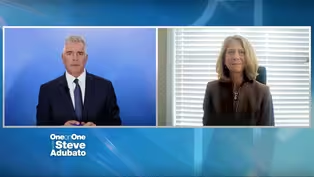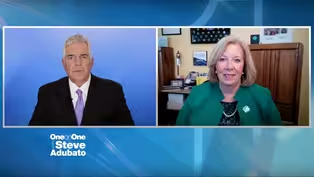One-on-One
Founder of Disrupt The Gap talks equitable hiring practices
Clip: Season 2024 Episode 2774 | 9m 6sVideo has Closed Captions
Founder of Disrupt The Gap talks equitable hiring practices
Steve Adubato welcomes Shell Bobev, founder of Disrupt The Gap, for a deep dive into the gender pay gap and equitable hiring practices in the workplace.
Problems playing video? | Closed Captioning Feedback
Problems playing video? | Closed Captioning Feedback
One-on-One is a local public television program presented by NJ PBS
One-on-One
Founder of Disrupt The Gap talks equitable hiring practices
Clip: Season 2024 Episode 2774 | 9m 6sVideo has Closed Captions
Steve Adubato welcomes Shell Bobev, founder of Disrupt The Gap, for a deep dive into the gender pay gap and equitable hiring practices in the workplace.
Problems playing video? | Closed Captioning Feedback
How to Watch One-on-One
One-on-One is available to stream on pbs.org and the free PBS App, available on iPhone, Apple TV, Android TV, Android smartphones, Amazon Fire TV, Amazon Fire Tablet, Roku, Samsung Smart TV, and Vizio.
Providing Support for PBS.org
Learn Moreabout PBS online sponsorship(upbeat music) - We continue talking to women business leaders with this very special program with Shell Bobev, who is the founder of an organization called Disrupt The Gap.
Shell, good to have you with us.
- Thank you so much.
- What the heck is that name and what does it mean?
- So Disrupt The Gap is a wage equality platform, and it's a play on the idea of a pay gap.
So think of Disrupt The Gap as a multi-front attack on pay gaps, serving the different stakeholders involved with the employment ecosystem.
- How'd you get interested in this?
- So I had a personal journey.
Like many people, I was in the corporate world, I encountered a pay gap.
I spent many years trying to fix it on my own, doing all the things we tell people to do.
And after that didn't work, I had to have the fortitude to hire a lawyer and I spent several years in court to pursue justice.
And on the other side of that, I realized that there was a calling to create systemic change.
- What's the gap?
I mean, make it clear because as a kid growing up I remember there were these buttons that people had and I think it said 59 and it was 59 cents, women earned 59 cents to every dollar a man earns.
I know it's not 59 cents, what is it?
- All right, so let's address this because there's a very common stat that's being circulated, which is that women are making 80 cents for every $1 that men are being paid.
I wanna address that.
So that very common stat is not looking at two peers in the same job, that stat is looking at annual median earnings across any job.
So, for example, here in New Jersey for men that's about 76,000, for women it's about 63,000.
However, I am much more focused on looking at peer-to-peer comparisons.
There are some studies that look at what that looks like.
And in general, the gap could be even smaller than that 20% mark, but there are absolutely occasions where it could be even wider - Talking to our producers, you shared something that I really need to understand better.
You said the phrase, quote, "Know your worth, and women should know their worth", is a problem.
- I think it's a problem.
Well, here's the thing, there's a beautiful intention there.
- Sure.
- However, I think the danger of that being circulated is it's being positioned as a way to close a pay gap, and it's being positioned as the individual, the woman taking the onus of closing the gap.
And I don't think it's appropriate to continue to tell individuals to that they need to bear the burden of fixing what's really a systemic issue.
And furthermore, when they try to close the gap personally and fail, they're then internalizing that as a personal failure and then probably having shame around that too.
So it's a beautiful message when one done appropriately, it has a place, but it's not the way that we're gonna fix a systemic issue.
- But Shell, by inference what you're clearly saying is that this is largely a male problem that men need to, if they are in a position of leadership to make decisions about compensation, it is on us, men, to make that change, or women who are in positions to dictate compensation, which is part of the problem we talked to Michele about is number of women business leaders isn't what it needs to be.
So my question is, is it on men largely?
- I think it's on people in a position of leadership, which historically has been men, but I do wanna offer this another angle to think about.
So often we frame pay gap conversations around gender, but beyond that and when we widen the lens, pay gaps are happening for all sorts of reasons beyond gender bias.
For example, you could have somebody doing the same job for 10 years getting a little increase every year and then their company hires somebody from the outside who just starts at a higher rate of pay and there's a pay gap right there.
So men experience pay gaps as well, I don't think that's right.
So to answer your question, we absolutely need people in a position of leadership to understand the business case for pay equality, and I do a lot of education around that, but I'd also like to add my voice to widening the lens that men experience pay gaps as well.
- So, Shell, if people go to your website, which is up right now as we're talking, what will they find and how would it be helpful to them?
- Well, they'll find a few things.
They'll see the vision of what Disrupt The Gap is all about and the long-term goals there, they'll be some resources for individuals and employers alike.
So, for example, one resource that's been pretty popular, I call it Hidden Gems For Salary Research.
It's a collection of databases.
- Hidden Gems, say it again.
- Hidden Gems For Pay Research.
- [Steve] Okay.
- Because a lot of the databases, the popular databases that people are using, they rely, so for example Glassdoor relies on self-reported data.
We don't know if that data is completely accurate, so what I've curated is a list of databases that are real data points that you might not know exist.
I'm gonna give you one example.
There's a work visa type called H-1B.
There's many people here that are in tech jobs that are working on that visa and all of their records are public information.
So for example, somebody could run a query and say, "You know, this tech company, software engineer, New York City, go," and then they will see real data points and not have to rely on self-reported data.
And obviously we have information on the services available, especially for employers.
- I appreciate what you said about know your worth is a complex, even though for the intent is a positive one, complex, which I often think about this, Shell, that money and compensation isn't just money and compensation.
- Yes.
- It is, in fact, a very strong message that an organization and the leader of that organization, and I'm a student of leadership, I try to understand this and we have a very strong group of disproportionately women who run our company every day.
It is a message that the organization and the leader of that organization is sending to those women and other employees about the value they believe they bring.
- Yes.
- That's heavy stuff.
- It's heavy.
I'm gonna offer you this.
In 2022, the US Surgeon General included transparent, equitable wages in a framework regarding psychological safety at work because it's recognized how damaging and destructive it is to human health when there are inequities in the workplace, so thank you so much for bringing attention to that.
- You're saying compensation related issues can impact one's mental health?
- Absolutely, absolutely.
It's incredibly distressing.
You know, often I teach what's the business case for equal pay, but really we shouldn't need a business case for something that is objectively ethical, moral.
And, you know, getting back to this know your worth paradigm, when we tell individuals that they have to bear the burden of preparing all this talking points and going in there, having the conversations with leaders, that can be a very challenging process that plays out over time and impact their wellbeing.
And I would say also people in the same household as well and financially and emotionally.
- Shell Bobev is the founder of Disrupt The Gap.
Important conversation part of our Women Business Leaders' special.
Shell, thank you so much.
It will not be the last time you join us.
We appreciate it.
- Thank you so much.
- You got it.
Stay with us, we'll be right back.
- [Narrator] One-On-One with Steve Adubato is a production of the Caucus Educational Corporation.
Celebrating 30 years in public broadcasting.
Funding has been provided by New Jersey Institute of Technology.
NJM Insurance Group.
PSE&G, IBEW Local 102.
Hackensack Meridian Health.
The New Jersey Economic Development Authority.
The Turrell Fund, a foundation serving children.
The North Ward Center.
And by The Port Authority of New York and New Jersey.
Promotional support provided by New Jersey Monthly.
And by BestofNJ.com.
NJM Insurance Group has been serving New Jersey businesses for over a century.
As part of the Garden State, we help companies keep their vehicles on the road, employees on the job and projects on track, working to protect employees from illness and injury, to keep goods and services moving across the state.
We're proud to be part of New Jersey.
NJM, we've got New Jersey covered.
The 10th Annual Women Business Leaders Forum
Video has Closed Captions
Clip: S2024 Ep2774 | 10m 21s | The 10th Annual Women Business Leaders Forum (10m 21s)
How Girl Scouts are preparing young girls to become leaders
Video has Closed Captions
Clip: S2024 Ep2774 | 8m 51s | How Girl Scouts are preparing young girls to become leaders (8m 51s)
Providing Support for PBS.org
Learn Moreabout PBS online sponsorship
- News and Public Affairs

Top journalists deliver compelling original analysis of the hour's headlines.

- News and Public Affairs

FRONTLINE is investigative journalism that questions, explains and changes our world.












Support for PBS provided by:
One-on-One is a local public television program presented by NJ PBS

